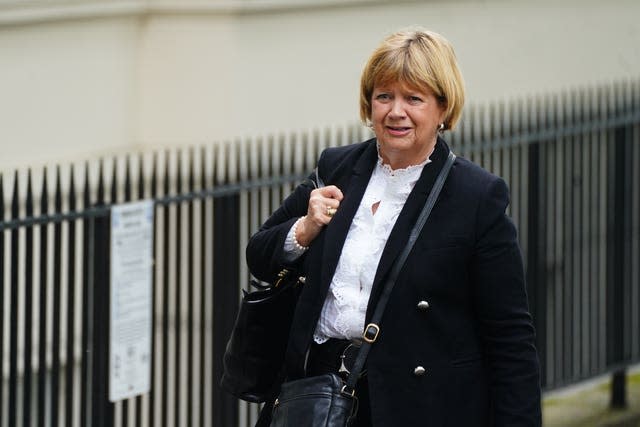Lawyers ask for clarity on when Covid probe will explore mental health impact
The chair of the Covid-19 Public Inquiry has faced calls to explain when the probe will examine the impact the pandemic had on mental health.
It comes after inquiry chairwoman Baroness Heather Hallett was accused of making a “U-turn” on the issue.
Mental health charity Mind had called for Module 3, which looks at how the pandemic affected healthcare systems, patients and healthcare workers, to explore the impact on wider mental health services, and not just inpatient psychiatric care for children.
After consideration, Lady Hallett ruled that the portion of the inquiry “cannot include the issue of the impact of the pandemic on adult mental health services within its broad provisional outline of scope and the hearing time available”.
Speaking at a preliminary hearing for Module 3 in London on Wednesday, Rheian Davies, head of legal at Mind, said that there were many “predictable” mental health issues during the crisis, adding: “There appeared not to be a public mental health plan to address what we say were these population health predictable issues. And why is that? And I say a perfectly proper question for this inquiry to examine.”
She said that the response from Government for the less predictable mental health issues “was not to learn lessons or intervene”.
Ms Davies also pointed to issues which arose in mental health inpatient and community services, including how people in hospitals were “locked in their rooms for five days at a time” and “denied access to showers”.
“Could this have been handled better? Is this something we could do different? These, we say, are perfectly proper questions this inquiry could answer,” she said.
“We want the Covid inquiry to succeed, we want its legacy to be that of a forward-looking inquiry that breaks with the tired tradition of excluding those of us with mental health problems because it’s often easier to do so,” Ms Davies said.
Adam Straw, representing John’s Campaign and the Patients Association, also called for clarity on when the impact on mental health will be explored.
“It’s not clear which module will examine this important issue, or why it doesn’t fit, most obviously, within this module,” he said.
At the end of the hearing, Lady Hallett said: “Because an issue is not included in a specific module does not mean the inquiry will not be considering it at all.”
“Please do not think that because you do not see the express words ‘X, Y, Z’ a specific module that means that X, Y, Z will not be considered.”
It comes after Mind, Rethink Mental Illness, the Centre for Mental Health, the Association of Mental Health Providers and other groups urged Lady Hallett to reconsider her ruling.
An open letter shared with the PA news agency said the “refusal” to examine the pandemic’s impact on mental health “risks failing the people with pre-existing mental health conditions who died at five times the rate of the general population”.

An inquiry spokesman said Lady Hallett “has explained that the inquiry will cover the pandemic’s impact on the mental health of the population throughout our investigations, including Module 3, as well as our UK-wide listening exercise, Every Story Matters”.
Meanwhile, lawyers at the preliminary hearing also raised concerns about so-called “spotlight hospitals”, facilities that have been selected to assist the inquiry in gathering evidence of the impact of Covid-19.
The inquiry sent requests to 22 hospitals across the country in order to gauge what steps were taken in response to the virus and the challenges they faced.
However, Pete Weatherby, who is representing the Covid-19 Bereaved Families for Justice group, told the probe he understands the approach and its design to “get a spread of evidence from across the UK” but urged “further consideration” on a number of “key issues”.
He noted that the selection of hospitals in Northern Ireland are in main cities, but not rural areas, while hospitals in Wales are located in the south, which Mr Weatherby said “excludes the health care experience from across the rest of the country”.
Speaking about the Welsh hospitals selected, Aswini Weereratne, representing Covid-19 Bereaved Families for Justice Cymru, said “large swathes of Wales – the rest of South Wales for example, north Wales and rural areas – are not covered by the selection made”.
Jacqueline Carey, lead counsel for Module 3 of the Inquiry, said: “The purpose of the spotlight is not to identify hospitals most severely affected by the pandemic.
“Nor was it to conduct an examination nation by nation, region by region, or hospital by hospital. It is not a comparative exercise comparing one hospital’s response against another, nor could it be.”


